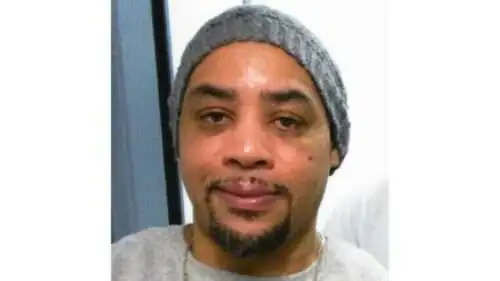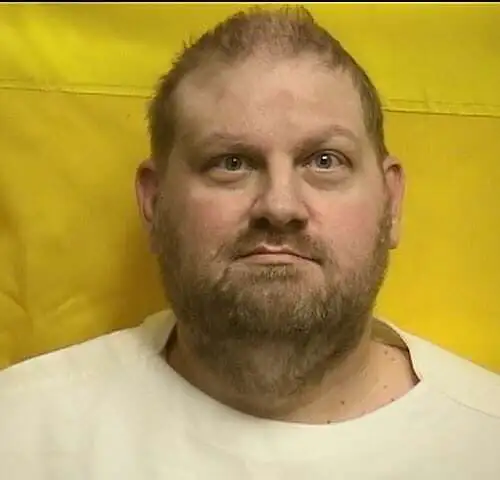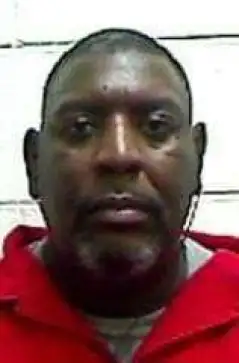Sedrick Clayton Murders 3 In Tennessee
Sedrick Clayton was sentenced to death by the State of Tennessee for a triple murder
According to court documents Sedrick Clayton following an argument with his girlfriend he would shoot and kill Pashea Fisher (his girlfriend) and her parents 56-year-old Arithio Fisher, his 46-year-old wife Patricia Fisher.
Sedrick Clayton would be arrested, convicted and sentenced to death
Sedrick Clayton Photos

Sedrick Clayton FAQ
Where Is Sedrick Clayton Now
Sedrick Clayton is incarcerated at Riverbend Maximum Security Prison
Sedrick Clayton Case
On the morning of January 19, 2012, A’Reco Fisher 4 was asleep on the sofa in his family’s living room. A’Reco lived in his parents’ home, in which his sister Pashea Fisher also resided with her four-year-old daughter, J.C.5 The defendant, who was Pashea’s boyfriend and the father of her child, arrived at the residence around 12:40 a.m.; he did not reside there and did not have a key to the house, so Pashea met him at the door to let him in. The defendant walked straight back to Pashea’s bedroom. In the early morning hours as A’Reco was sleeping, he was awakened by the sounds of an altercation and gunshots within the home. He heard Pashea crying, and he heard the defendant’s voice. The gunshots startled A’Reco because the family did not own guns, and he did not know that the defendant had a gun. At this time of morning, it was still dark in the living room. A’Reco looked up and saw Pashea and the defendant arguing. Pashea walked down the hall toward their parents’ bedroom. She entered the bedroom and shut and locked the door behind her. The defendant kicked open the door and fired his weapon. Pashea was yelling, “Stop, stop!” A’Reco then saw the defendant “handling” Pashea in the hallway. The defendant “dragged” Pashea to the front of the house, which was the living room. Pashea attempted to fight off the defendant and yelled at A’Reco to call 9-1-1. A’Reco heard the defendant tell Pashea that he was going to shoot her; he then continued to drag her and shot her in the head. The shooting occurred approximately twelve feet away from where A’Reco was positioned. The defendant then ran out of the house, taking J.C. with him. A’Reco heard a vehicle that sounded like Pashea’s start up and drive away. He called 9-1-1. He checked on Pashea and determined that he could not do anything for her. A’Reco never saw his parents prior to the shooting, but he “glanced” in their bedroom afterward. Patricia was “fighting for her life,” and Arithio was “already unconscious.”
A Memphis Police Department (“MPD”) radio dispatcher received a 9-1-1 call at 5:40 a.m. from the land line at the Fishers’ residence. She described the call as an “open line call” in which the dispatcher listens to background noises or conversations but the caller never speaks. The dispatcher could hear male and female voices screaming in the background. She could also hear a small child crying. The dispatcher heard a “gurgling” sound but was unsure of the source. In the background, the dispatcher heard someone else placing a 9-1-1 call. While this open line call was ongoing, another dispatcher received the call from a male caller using a cellular telephone. The dispatcher also heard two gunshots, after which the female voice became silent. She dispatched the police, the fire department, and an ambulance to the address.
After leaving the Fishers’ home, the defendant telephoned Adrienne Lewis, an occasional girlfriend and the mother of one of his children. Ms. Lewis worked the late shift that night, and she was still at work when he called. Ms. Lewis said that the defendant sounded “scared.” He said he needed her to “help him think.” He asked her to leave work, and then he drove toward her place of employment. The defendant left Pashea’s Cadillac in a parking lot near Ms. Lewis’s place of work, and he and Ms. Lewis drove away in her vehicle. J.C. was also with the defendant. They drove first to Ms. Lewis’s home. As he was crying and shaking, the defendant told Ms. Lewis that he had “flipped out” and that he had shot “them.” He said, “I don’t know who I shot or what I shot. I just know somebody in the house ․” They also picked up their daughter, Y.C., because the defendant did not know when he would see his children again. Around ten minutes later, they drove to the home of the defendant’s sister Tameka Rhodes. While there, a news broadcast reported the shooting and stated that two people had been pronounced dead. Soon thereafter, Jesse Clements, the defendant’s brother-in-law, drove the defendant, Ms. Lewis, and the two children to the police precinct in Mr. Clements’s vehicle.
MPD Sergeant Richard Borden with the Felony Response Bureau responded to the scene at Preston Street. Around 7:15 a.m., Lillian Harvey, the defendant’s mother, walked up to Sergeant Borden at the scene. She had seen the news reports and thought she could help. She had spoken with the defendant and reported that he wanted to turn himself in to authorities. After several telephone calls between Sergeant Borden and the defendant, the defendant informed Sergeant Borden that he was proceeding to the Raines Station. At 8:47 a.m., Sergeant Borden received notification that the defendant was in custody and that J.C. was safe. A 0.40 Smith & Wesson pistol and two magazines were recovered from the rear passenger floorboard of the car in which the defendant arrived. The car was driven by another male and occupied by a female and two small children, both female.
MPD Officer Chase Merritt was the first officer to arrive at the crime scene. Through the glass front door he observed a “motionless” female lying in the floor. Upon entering the residence, he noticed an apparent gunshot wound to her temple. At that time, someone called out from the rear of the house, and a black male, who was later identified as A’Reco Fisher, walked down the hallway. After explaining the circumstances of shootings, A’Reco told officers that the defendant took J.C. with him but that J.C. did not want to go.
MPD Officers Matthew Biggs and Michael Tran were the next officers on the scene. When they entered, they had to step over the body of Pashea Fisher to access the rest of the house. Officer Tran approached the master bedroom and noticed that the door had been kicked in and was cracked, and there were pieces of wood scattered about. They observed the body of a black male. His eyes were open, and there was a great amount of blood around his face and torso. A black female was found at the other end of the room; she was moving with difficulty and “making noises.” She was unresponsive to verbal instructions. She was later transported to the hospital. In the bedroom, officers noticed bullet holes and casings, but no firearms were recovered from the residence.
MPD Lieutenant Anthony Mullins reviewed the scene and determined that the shooting began in the bedroom area and moved toward the front door. He also noted a bullet hole in the arm of the sofa through the pillow where A’Reco had been sleeping. A’Reco testified that he was startled awake by the sound of gunshots.
Emergency personnel pronounced Pashea and Arithio dead at the scene. Patricia Fisher was pronounced dead at the hospital after life-saving efforts were unsuccessful. One of the three bullet wounds she sustained entered the chest, perforated the diaphragm, the transverse colon, segments of the small bowel, and the aorta. Arithio Fisher’s fatal wound was a gunshot to the neck that tore the right carotid artery and traveled through the left lung. Pashea’s cause of death was a gunshot wound to the head that went through the left temporal lobe, the left petrous temporal bone at the base of the skull, and exited through the left occipital bone. When her skull was fractured, bone fragments (secondary projectiles) broke loose and caused more damage. The gunshot left stippling at the wound site, which indicated that the bullet was fired from five or six inches to three feet away. The forensic pathologist determined that the causes of death for all three homicide victims were multiple gunshots, and the manners of death were murder.
A firearms identification expert opined that all of the cartridge cases and the intact bullets that were submitted by law enforcement were fired from the firearm that was recovered at the time of the defendant’s arrest. The gun was in operating condition, and the two magazines both fit the weapon and functioned in the firearm.
During the course of the investigation, Lieutenant Darren Goods interviewed the defendant. Lieutenant Goods and Sergeant Joe Stark escorted the defendant to the restroom and began the interview shortly after 4:00 p.m. on January 19, 2012. The reason for the delay was that Lieutenant Goods waited to receive additional instructions and for the Crime Scene Unit to use the alternative light source on the defendant to detect any gunshot residue. Lieutenant Goods also wanted to ensure that he was aware of all of the evidence so he could determine whether the defendant was being truthful.
Both officers entered the interview room unarmed. The defendant was shackled by his ankle to a bolted-down bench in the room. After making introductions, Lieutenant Goods assumed the lead role and explained why they were there. He told the defendant that they were investigating the homicide of the three victims. Lieutenant Goods wrote down the defendant’s biographical information and noted that “[h]e was very coherent. He understood. There [were] not any issues with him not understanding anything that we were saying.” The defendant said that he completed the ninth grade at Southside High School. He denied having consumed alcohol or taken prescription drugs prior to the interview but admitted smoking marijuana at 8:00 or 9:00 p.m. the previous night. He disclaimed any mental health issues. Based on Lieutenant Goods’ twenty-nine years of experience in police work, the defendant did not appear to suffer any after-effects of smoking marijuana the night before.
Before Lieutenant Goods could review the Advice of Rights form with the defendant, he began making a statement. The defendant said, “I’m sorry. I didn’t mean to do it ․” or “something along those lines.” Sergeant Stark, who was taking notes, transcribed the quote as, “I’m so sorry. You ain’t even got to say it.” Then the defendant whispered, “I’m sorry.” Lieutenant Goods asked him to pause his statement so they could review with him the Advice of Rights form. The defendant then stopped talking, and the officers and the defendant read, reviewed, and signed the Advice of Rights form. As he was writing the date the defendant said, “This is Pop’s birthday.” The official start time of the interview was 4:32 p.m.
Pursuant to the department policy, Lieutenant Goods began the process by taking a verbal statement from the defendant. He said that “[the defendant] began to tell his version of what happened. And his initial version of what happened wasn’t exactly consistent with the evidence.” The officers confronted the defendant with the initial evidence, the medical information, and the 9-1-1 recordings. Lieutenant Goods recalled that “Pashea could clearly be heard on the 9-1-1 tape of begging him not to kill her parents.” The defendant commented, “She’s playing a game cause they were already – that had already happened.” The defendant’s verbal statement lasted one hour, during which he had a break to use the restroom.
The defendant changed his statement more than once during that hour. He never asked to stop the interview and never asked for an attorney. Lieutenant Goods said that he would have stopped the interview immediately if the defendant had requested either. The defendant had already been placed under arrest and was not free to leave at that time. If he had ceased the interview, he would have gone straight to jail.
In the final version of the defendant’s verbal statement, he said that he and Pashea had been dating for some time. Around 12:30 a.m., as the defendant and Pashea were engaged in sexual intercourse, the defendant noticed a strange smell as though Pashea had been having sex earlier in the day. An argument arose between them, and Pashea admitted to him that she had been seeing someone else. The two of them continued to argue, then the defendant calmed down. They discussed the issue for a couple of more hours then engaged in “makeup sex.” Afterward, the defendant acted as though he was going to leave her. The defendant arose to leave, and Pashea begged him to stay. The defendant tried to walk out of the room and out of the house, but he realized he left his keys and some belongings in the house. He turned around and walked toward the bedroom area but stopped at the bathroom to “wash himself off.” Pashea entered the bathroom, and they argued some more. As the defendant was attempting to leave, Pashea began to tug on his shirt or jacket, which led to a “tussle in the hallway.”
The defendant noticed that a light had turned on in Mr. and Mrs. Fisher’s bedroom. At some point during the argument, her parents’ bedroom door opened, and a “bright light” shined on him. “[A]ll of a sudden, [Arithio] knock[ed] him down, knock[ed] Pashea down.” During the struggle, the defendant dropped his gun, the magazine, his keys, and his “dope” scales. He picked up the gun and started shooting. The defendant claimed that he fired because “he was in fear of his life.”
Arithio and Pashea then walked into Arithio’s bedroom. The defendant used his shoulder to break down the door into the bedroom and forced his way in. He began shooting into the room. He saw Patricia crawling across the bed and fired in her direction. He watched her fall in front of the mirror. The defendant initially did not think that he shot her and that she was just hiding. He turned to leave but came back and reloaded his weapon.
The defendant confirmed that he was aware that A’Reco, the Fishers’ son, usually slept in the living room, either on the sofa or in the recliner. Because it was dark, the defendant shot in the general direction of where A’Reco would have been sleeping. Meanwhile, Pashea held onto the defendant, begging him not to kill her parents. The four-year-old child, J.C., began screaming. The defendant maintained that at some point, Pashea grabbed him and the gun discharged, which is when she was struck and killed. The defendant grabbed the child, left the residence, and telephoned another girlfriend to pick him up. During the call, he told the girlfriend that he had just shot the Fishers and Pashea and he was trying to get his head straight.
As the transcriptionist typed the defendant’s statement during the interview, the defendant corrected her as she typed and then reviewed the final statement for corrections. The defendant made more corrections to his statement than Lieutenant Goods had ever seen anyone make. During the typewritten statement, the defendant asked, “[W]hat if I want an attorney?” Lieutenant Goods said they would stop and get him an attorney, but the defendant said he wanted to continue. Lieutenant Goods opined that the defendant had no problem understanding what was happening; he made a correction on almost every page of the statement, and most of the changes were made in a way to try to mitigate his involvement. At one point, the officers tried to take a break for themselves, but the defendant said that he wanted to keep talking, so they sat back down.
With regard to A’Reco Fisher, the defendant said that if he shot toward him, it was “not on purpose, but [he] shot in the living room to scare [A’Reco] so [he] could get out.” After the interview was completed, Lieutenant Goods encountered the defendant as he was awaiting the transport car to escort him to the Shelby County Jail. Lieutenant Goods described the defendant’s demeanor as “cavalier.” He said, “We were just kind of sitting around, talking. And he was cavalier about what had happened and I started to get a little angry with him. And he said something – ‘I don’t know why you’re raising your voice. It’s not a big deal,’ or something along those lines.”
Upon this evidence, the jury found the defendant guilty as charged of all counts in the indictment: Count I: first degree murder of Arithio Fisher; Count II: first degree murder of Patricia Fisher; Count III: first degree murder of Pashea Fisher; Count IV: attempted first degree murder of A’Reco Fisher; Count V: possession of a firearm with the intent to go armed during the commission or attempt to commit a dangerous felony; Count VI: employing a firearm during the commission or attempt to commit a dangerous felony; and Count VII: unauthorized use of a motor vehicle. See Tenn. Code Ann. §§ 39-12-101, 39-13-202(a)(1), 39-14-106, 39-17-1324(a).
https://caselaw.findlaw.com/court/tn-supreme-court/1880426.html














